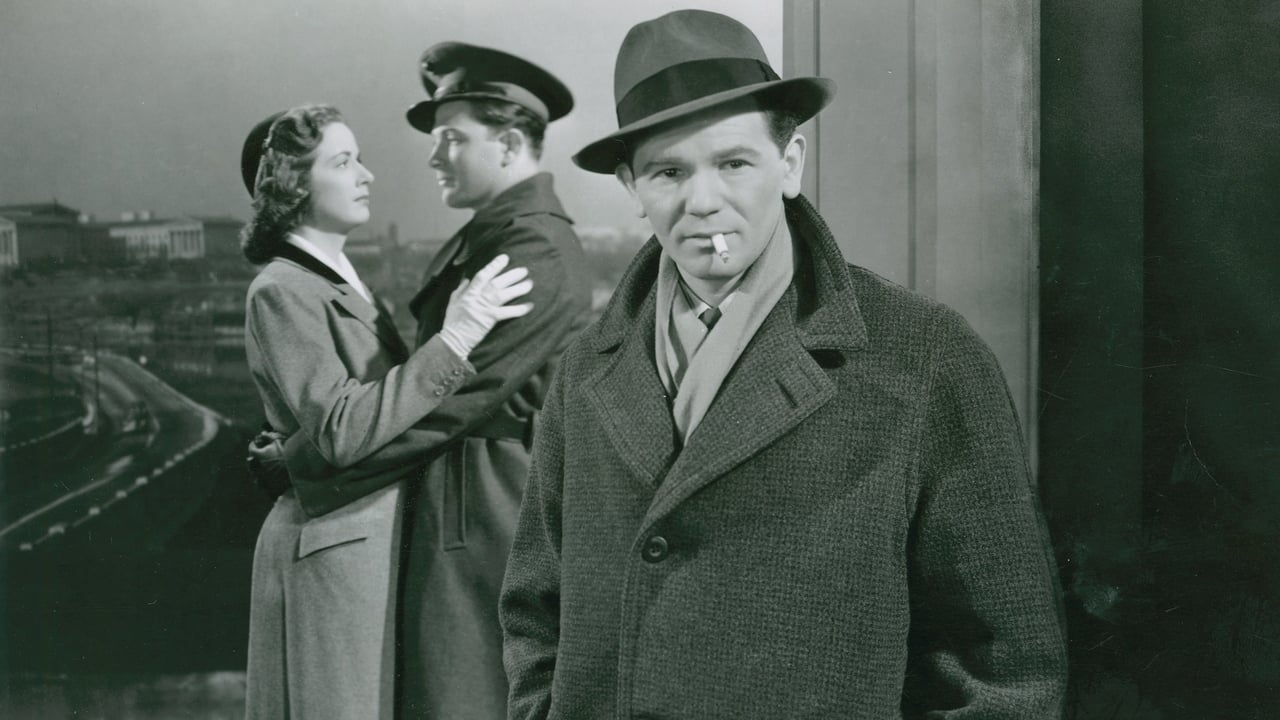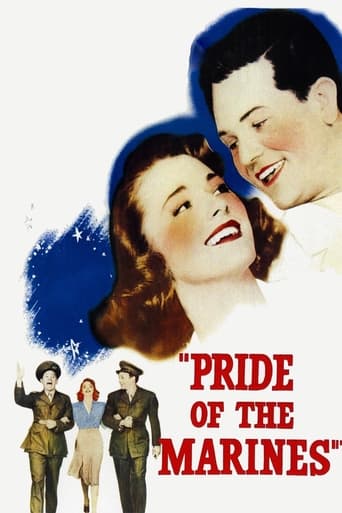

it is the rare 'crazy' movie that actually has something to say.
... View MoreIt's the kind of movie you'll want to see a second time with someone who hasn't seen it yet, to remember what it was like to watch it for the first time.
... View MoreThe movie's not perfect, but it sticks the landing of its message. It was engaging - thrilling at times - and I personally thought it was a great time.
... View MoreThis is one of the best movies I’ve seen in a very long time. You have to go and see this on the big screen.
... View More" . . . than bears," 'Ordinary Joe' Al Schmid tells his girlfriend Ruth on the eve of his WWII enlistment into the U.S. Marines. This interchange came in a fact-based movie made the year that America nuked Japan twice, decades before Congress enabled Japanese companies such as Sony to wrest control of the major U.S. film studios and rewrite history to their liking. Since kids today wouldn't be caught dead watching black and white flicks, the only version of The Truth they get is a pack of revisionist lies. If it were possible to hijack a lecture hall full of American college students and compel them to sit through "PRIDE OF THE MARINES," there might be hope for us. However, more than half of such a captive audience would be comprised of "exchange students," sent here to learn our vulnerable spots. Perhaps clairvoyance of today's realities (or of his own assassination a few years later by rabid Congressman Joseph McCarthy) helped actor John Garfield instill so much anger into his character, real life hero Schmid. Sure, Al's a little upset when circumstances force him to gun down 200 Japanese troops in just four hours on Guadacanal (far above his native Pennsylvania's bag limit for bears), despite being blinded by a grenade exploding in his face. But right up to the happy ending, he's "loaded for bear," and rightfully so.
... View More***SPOILERS*** On of the first WWII movies coming out of Hollywood that shows how the war effected those GI's, or in this case US Marines, who fought in it.21 year old Al Schmid, John Garfield, was just starting to live with a well paying job-earning some $40.00 a week-at the local steel mill and girl Ruth Hartley, Elenore Parker, whom he was about to marry when the Japs spoiled everything for him, and millions of likewise young Americans, by attacking the US Pacific Fleet at Pearl Harbor. Doing his duty as an American citizen Al immediately joined the US Marine Corps hoping to get back at the Japs knowing, correctly as it was to turn out, that the Marines would be the first American combat units to get a crack at them.Al finally got his chance when his unit, the 1st Marine Division, landed on August 7, 1942 at Guadalcanal in the far flung Solomon Islands to engage the Japanese who were were in control of it. It was during the battle of the Ilu River that Al almost single handed stopped a massive Japanese Banzai attack holding off, with his machine gun, wave after wave of suicide attacks by the determined Japs until help, or reinforcements, finally arrived. It was during the bloody fighting Al was hit in the face by a Jap grenade that ended up blinding him.Now back in the states convalescing at a naval hospital Al is faced with something far more harder to overcome then battling a battalion size attack of Japanese or German soldiers. He's faced with a future where he'll never see again and having to depend on others to look after, or for, him!We get to see in the film "Pride of the Marines" Al battle himself far harder then he did the Japanese troops on Guadalcanal in just coming to terms with his disability. Not wanting anyone, especially his girlfriend Ruth, to feel sorry for him Al in fact is the one who feels sorry for himself more then anyone else in the movie. It's with the help of Navy Nurse Virginia Pfeiffer, Rosemary DeCamp, and Ruth together with his US Marine buddy Lee Diamond, Dane Clark, that in the end gives Al the courage to face his blindness with the same strength that he faced wave after wave of Japanese troops on Gudalcanal. A courage Al thought he lost back in that God-forsaken island hell in the South Pacific.Based on the true story of US Marine Sergeant Albert Schmid "Pride of the Marines" showed what we were to expect from the tens of thousands of wounded US Servicemen coming back from the war. We get to see how it in many ways was far more difficult for those fighting the war to adjust to a peacetime America when they left something, like in the case of Al Schmid, behind on the battlefield. Al's battle with his personal demons was a lot harder then the Japanese that he fought in that they were part of him and thus had to fight himself in order to overcome and eventually defeat them. Despite the help that he got from both Nurse Virginia and his girlfriend Ruth as well as his Navy doctor-who has a striking resemblance to actor Gregory Peck-it still was up to Al to overcome the fears that he faced. Fears which he and only he had to both battle and overcome, like he was told by everyone in the movie, all by himself.
... View MoreDefinitely at the top five of best John Garfield movies has to be Pride of the Marines. It's the true story of Marine private Al Schmid who at the cost of his own sight, while wounded held off a horde of storming Japanese on Guadalcanal. The story nicely segments in three parts, Al Schmid's home life where he's a simple working stiff who's just getting serious with a woman and who likes nothing better than his bowling night. Pearl Harbor is bombed and he's off to war as millions of others were.The second part is at Guadalcanal and we see part of the action where he's in an isolated machine gun nest, holding off Japanese troops. His action prevented Marine positions from being overrun, but a grenade does in his eyesight.And of course the third part is his painful adjustment to civilian life and to reassure himself that people aren't just caring for him out of pity, most of all that girl he was seeing Eleanor Parker.This film was broadcast on TCM on John Garfield's 95th birthday and there was a documentary on Garfield hosted by his daughter. One of the people interviewed said that Garfield was the actor most believable in working class roles in having and holding a union card. In that respect he was lucky in that he did land with Warner Brothers in Hollywood. Though he kept getting typecast in gangster roles in the tradition of that studio, Garfield was terrific in these parts because of his background, because he came from the kind of life Al Schmid had, with the exception of Garfield's Jewish background.In that respect he was perfect to play the part of a working class hero like Al Schmid who accepted the responsibility of defending his country. No super heroics here, just a guy who'd rather have been back in Philadelphia, but doing a job that had to be done.It's a great part for Garfield. It's a film one shouldn't miss. I do wonder though whatever happened to the real Al Schmid.
... View MoreThis was one of the better or best WWII movies of its time. It hasn't been shown on TV in quite a while and am wondering why. John Garfield was perfect as Al Schmid, the blinded hero of Guadalcanal. The action sequence of him holding off a superior Japanese force with a machine gun was spellbinding. He was awarded the Navy Cross although I thought he should have gotten the Medal of Honor. Why isn't this movie on VHS or DVD? He was one of the real heroes of the Pacific war and his story should be available to today's generation. Instead we were bombarded by the media of Pvt Jessica Lynch who never even fired her weapon at anyone and came home a hero. Where is the justice?
... View More